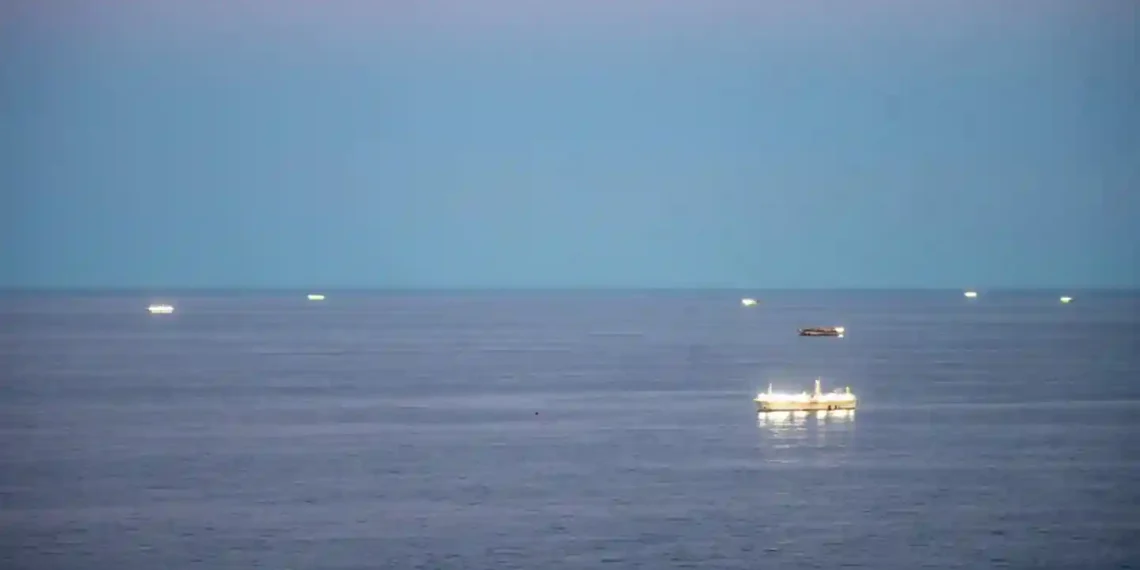Argentina Deploys Military to Monitor Chinese Fishing Vessels Off Its Coast
Surveillance Mission Over the South Atlantic
A P-3 propeller plane soars over the South Atlantic, its silhouette stark against the Argentine sunset. Below, the sea shimmers with hundreds of bright lights—dozens of fishing vessels clustered near Argentina’s exclusive economic zone (EEZ). The scene, captured in late February by the Argentine military, highlights the growing challenge posed by foreign fishing fleets in the region, particularly those from China.
Argentina has intensified efforts to combat illegal and unregulated fishing, a crisis experts warn is pushing the region toward environmental collapse. Most vessels in these waters hunt for squid, a crucial species in the marine ecosystem. The Argentine Navy reports that many of these ships originate from China, a nation frequently criticized for its exploitative fishing practices worldwide.
The Military’s Response
In response to the growing threat, the Argentine military launched a surveillance operation in January, deploying:
- A P-3C Orion surveillance plane (designed for anti-submarine and maritime patrol),
- A C-12 aircraft for additional reconnaissance,
- Two corvette warships to monitor vessel movements.
According to Argentina’s Defense Minister Luis Petri, the operation aimed to prevent illegal intrusions into the country’s EEZ. The mission identified 380 fishing vessels, the majority of which had traveled from Asia to exploit Argentina’s rich waters.
To bolster its monitoring efforts, Argentina has recently acquired multiple planes specifically designed for maritime surveillance. Petri emphasized the severity of the issue, stating, “The natural resources of all Argentines are at stake.”
A ‘Floating City’ of Chinese Fishing Vessels
An analysis by Global Fishing Watch and CNN found that in late February, 198 named fishing vessels were operating near Argentina’s EEZ:
- 80% of these ships flew under the Chinese flag,
- 10% were Spanish,
- 5.5% were registered in the United Kingdom or the Malvinas/Falkland Islands.
The cluster of ships stretched 150 miles along Argentina’s coastline, raising concerns over unsustainable fishing practices. Many vessels use bright lights at night to lure squid—so intense that they are visible from space.
Satellite imagery and ship tracking data reveal that Chinese-flagged vessels frequently disable their location beacons (Automatic Identification System, AIS), allowing them to disappear from monitoring platforms. Over the past year, 92% of these AIS deactivations involved Chinese vessels, a common tactic for illegal fishing.
Sanctions and Human Rights Concerns
Among the identified vessels, seven Chinese ships were operating under U.S. sanctions for involvement in illegal fishing and human rights abuses. These vessels are linked to Fujian Provincial Pingtan County Ocean Fishing Group Co., Ltd., a Chinese company blacklisted by the U.S. Treasury in 2022.
According to the U.S. Treasury Department, Pingtan Fishing Group has engaged in:
- Illegal fishing in protected waters, including the Galápagos Islands,
- Transport of endangered species, including over 6,600 shark carcasses,
- Forced labor and worker abuse, including withholding wages and food deprivation.
China’s Foreign Ministry has denied these allegations, insisting that it enforces strict fishing regulations and maintains a “zero tolerance” policy toward illegal activities.
Argentina’s Fishing Industry Under Threat
For decades, Argentina has struggled with illegal fishing, particularly from foreign vessels. Conservationists warn that squid depletion could have catastrophic effects on the ecosystem since it is a key food source for marine life.
Milko Schvartzman, an expert on illicit fishing, explains, “Any impact on squid has an impact on the whole ecosystem.” The United Nations echoes this concern, warning that unregulated fishing can lead to the collapse of local fisheries.
Beyond environmental concerns, the crisis directly impacts Argentina’s economy. The Argentine Chamber of Squid Jig Owners estimates that local fishermen lose half of their potential catch due to foreign overfishing. Currently, Argentina’s authorized fleet consists of just 70–75 vessels, compared to the 550 unregulated ships operating near its EEZ.
A Global Issue
Argentina is not alone in facing this crisis. Chinese fishing fleets have been spotted depleting marine resources across:
- West Africa,
- The South China Sea,
- South America.
China’s fishing expansion is driven by soaring domestic seafood demand. Once a luxury, seafood has become a dietary staple across China, making the country the world’s largest seafood consumer. Experts predict that China will drive 40% of global seafood consumption growth by 2030.
With foreign fleets pushing into Argentina’s waters, Schvartzman warns that the damage extends beyond legal boundaries: “A fish doesn’t understand imaginary borders. The impact of overfishing is the same whether a vessel is inside or outside Argentina’s EEZ.”
Conclusion
The Argentine military’s surveillance efforts highlight a broader global challenge: the unchecked expansion of distant-water fishing fleets. As China continues its aggressive pursuit of marine resources, Argentina faces an uphill battle to protect its waters, economy, and environment. Without stronger international enforcement and sustainable fishing practices, the future of the South Atlantic’s marine ecosystem remains at risk.
This article was rewritten by JournosNews.com based on verified reporting from trusted sources. The content has been independently reviewed, fact-checked, and edited for accuracy, neutrality, tone, and global readability in accordance with Google News and AdSense standards.
All opinions, quotes, or statements from contributors, experts, or sourced organizations do not necessarily reflect the views of JournosNews.com. JournosNews.com maintains full editorial independence from any external funders, sponsors, or organizations.
Stay informed with JournosNews.com — your trusted source for verified global reporting and in-depth analysis. Follow us on Google News, BlueSky, and X for real-time updates.













